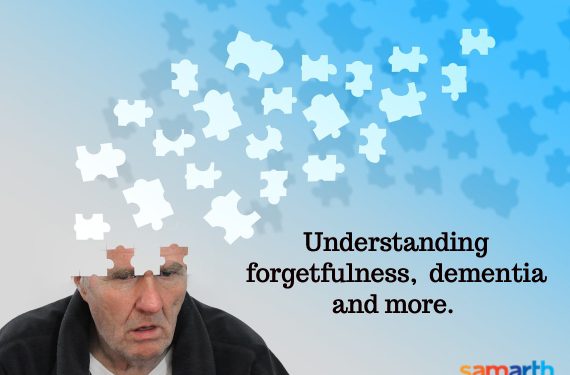Is Forgetfulness Normal in Aging?
Forgetfulness or memory loss is one of the most feared issues of ageing for seniors. This fear is of the extreme dependence that it brings, along with the anxiety about the possibility of forgetting important tasks or even our loved ones. Many consider forgetfulness as a normal sign of ageing. But is forgetfulness inevitable as we age? I am sure each of us would have had some relatives who have lived to a ripe old age without having any issues with their memory. So, it is not inevitable as believed by many, and it impacts different people in different ways.
But, we also see forgetfulness impacting the quality of daily life for some seniors, so it is not to be ignored or taken lightly either. Could it be an indication of something else? What should one watch out for, and when should one seek help and treatment? Let’s try and dig a little deeper into this phenomenon to understand it better.

Join Now >
Understanding forgetfulness
Some amount of forgetfulness may creep in as we age. For example, we may forget to pay a bill or pass on a message. We may forget someone’s birthday, lose something, or take a little longer to learn a new skill. None of these is alarming as such and is considered a normal part of ageing. However, at times, the people around us may observe some patterns in our forgetfulness. When forgetfulness starts affecting daily life and is coupled with impaired cognitive capabilities, it could indicate another medical condition.
Dementia is a condition that involves memory loss, thinking capabilities, and also social abilities. It is not a single disease term as many understand it. It is an umbrella term used to refer to many symptoms that indicate a decline in brain function. A person affected by dementia may easily forget things, including something part of a normal routine. They may ask the same question multiple times or forget a person or the way to reach their own home. They could even forget a learned skill like driving or cooking. They may appear confused and find it difficult to follow directions, and in its severe form, may even forget to eat or bathe, etc.
An important note is that, unlike the forgetfulness mentioned above, dementia is not a normal part of ageing. All forgetfulness need not lead to dementia, though it is one of the most common symptoms leading up to it. Alzheimer’s Disease is one of the most common causes of dementia in older adults. But it is not the only cause, and depending on the cause, some of the symptoms of dementia are reversible.
There is also a condition called mild cognitive impairment (MCI). People affected by this condition have slightly more issues with their memory and thinking than others their age. However, it is not dementia, and such people can take care of themselves and their daily routine. Also, MCI symptoms may well be due to reversible causes that can be treated. Possibly, MCI may be an early sign of Alzheimer’s disease, but not all people with MCI need to have Alzheimer’s or dementia.
What is dementia?
Unlike the normal forgetfulness of ageing, dementia has underlying causes associated with it. Dementia is caused when certain nerve cells and their connections in the brain are damaged or lost. It could be because of some protein(s) deposited in parts of the brain. People with dementia show different symptoms based on which part of the brain is affected.
People with complaints of memory loss or cognitive impairment are put through various tests and assessments to determine the probable cause. Normal forgetfulness does not need any treatment, and people only need to follow certain schedules to keep their faculties sharp. They would also need to follow a healthy diet and exercise regimen.
However, if the people have been diagnosed to have MCI, they need to visit the doctor to track their progress periodically. They may be suggested certain techniques to deal with the changes in their memory and thinking. It has been observed that the symptoms of MCI may remain constant or improve across a period.
Types of dementia
Alzheimer’s disease is the most common cause of dementia. It can also be caused by gene mutations, while family history is another cause. People above 65 years of age are at a higher risk of developing dementia. However, young people too can develop dementia. People with Alzheimer’s develop clumps of a protein called beta-amyloid in their brains. They could also have fibrous tangles in the brain, made up of tau protein. Both clumps and tangles affect the healthy neurons and their connections. The most common symptom noticed here is memory loss.
Another form of dementia namely, vascular dementia, is caused by the damage to the vessels supplying blood to the brain. It can affect the brain in many ways, causing strokes or damaging white matter in the brain. In this condition, symptoms like loss of focus, slow thinking, and difficulty in problem-solving are observed.
Lewy body dementia is a common form of dementia in which abnormal balloon-like protein clumps are found in the brain. Such people have problems focusing, have hallucinations, and vivid dreams. At times, they also have tremors, as happens with Parkinson’s disease. They also may have issues in coordination and slow movements, etc.
The frontal and temporal lobes of our brain are associated with personality, behaviour, and language skills. When the nerve cells in this part of the brain are damaged, a form of dementia known as frontotemporal dementia occurs. Hence, the associated symptoms observed are variations in personality, behaviour, thinking, language, and movement skills.
It has also been observed that, at times, people develop dementia due to a combination of all the above. In addition, dementia may also occur due to certain other conditions like Huntington’s disease, Parkinson’s disease, Down’s syndrome, Creutzfeldt-Jakob disease, or even traumatic brain injuries. In traumatic brain injuries, the symptoms may appear much later, after the trauma has happened.
Dementia or dementia-like symptoms may happen due to infections, immune disorders, nutritional deficiencies, medication side effects, brain tumours, metabolic disorders, bleeding, or enlarged brain ventricles. Most of these are treatable conditions that can help reverse dementia symptoms.
How do I know if I have dementia?
While dementia is not self-diagnosable, one may observe certain symptoms by self. However, in most cases, the more prominent symptoms and patterns of memory loss, impaired thinking, and difference in cognitive capabilities will be observed by people around you. Some other common symptoms are:
- Difficulty communicating or finding the right words
- Confusion or disorientation
- Forgetting known skills or languages
- Inappropriate social behaviour
- Feeling confused even in familiar environments
- Anxiety
- Depression
- Hallucinations
It needs to be observed by a medical professional, and the help of a doctor should be sought to determine if you have dementia. The doctor can assess, identify the underlying cause and proceed with the required line of treatment. The tests include cognitive, neuropsychological, laboratory, and psychiatric tests that indicate the cause.
It is not a good idea to presume the presence of dementia and get anxious about it. The best approach is to consult a doctor at the earliest, when in doubt. Even though there is no known cure for the disease, it can be managed using a combination of treatment methods. The treatment may include medications, behavioural and simulation therapies, lifestyle changes, and planning for the future. Cognitive rehabilitation is also an essential part of dementia treatment as it enables individuals to retain their skills and cope better with the disease.
How to prevent dementia?
Prevention is better than cure. However, with something like dementia, which in most cases is irreversible, can we adopt a prevention mode? The answer to this question is not very encouraging. How can we prevent something when all the underlying causes are not yet fully identified? What are the identified risk factors that contribute to dementia according to the various research done so far? There are risk factors like age and genes about which one cannot do anything. However, many risk factors among those identified can be managed to reduce the risk of developing dementia.
Diet: A healthy and balanced diet can reduce the chances of developing dementia. An unhealthy diet consisting of high saturated fats, salt and sugar, and low fibre can bring about health issues like hypertension, obesity, diabetes, etc. These issues are risk factors leading to dementia. If possible, follow a Mediterranean diet that includes lots of fruits, vegetables, Omega-3 fatty acids, and whole grains.
Exercise/Obesity: Obesity can lead to Type 2 diabetes, cardiovascular issues, and high blood pressure, all of which can lead to dementia. A research study quoted sitting for most of the day also as a risk factor of dementia. Hence, regular exercise is also a must to keep dementia at bay. Walking, climbing stairs when possible, mild to moderate aerobic activities, etc., can help a person to remain fit and ward off many health issues.
Alcohol: Excessive alcohol use is one of the many risk factors leading to dementia. Long-term alcohol usage causes nervous system issues and degenerative changes to the brain that lead to dementia. It may be best to avoid alcohol altogether or limit the drinking based on a discussion with the doctor.
Diabetes: Diabetes management can be one of the dementia prevention methods, as it is a risk factor leading to it. With a proper diet, exercise schedule, and medication, diabetes can be managed easily.
Cardiovascular issues: High cholesterol, high blood pressure, and cardiovascular conditions all contribute to obesity and other health issues that contribute to the risk of dementia. Monitoring these with periodic checkups and medications is essential.
Smoking: This habit causes your arteries to become narrower, leading to high blood pressure and cardiovascular diseases. Hence, it may be best to quit smoking altogether.
Depression: Dementia causes depression, but vice versa is also true! Depression, especially late-life depression and untreated ones, can contribute to dementia. Hence, please plan to visit a doctor if you feel depressed and anxious and notice unsocial behaviour.
Pollution: Air pollution aids the degeneration of the nervous system and is thus a risk factor for dementia. You may choose to move to a less polluted place for a healthier living.
Nutritional deficiencies: Perhaps, this risk factor should indicate why it is essential to have a healthy and balanced diet and periodic checkups. It appears low Vitamin D, Vitamin B-6, Vitamin B-1, and folate levels are risk factors of dementia. So, it is better to monitor them and take supplements as suggested by a doctor, if required.
Sleep: Disturbed or less sleep and even taking sleep medications put you at a higher risk of developing dementia. So, it may be best to try and find natural ways to sleep better and avoid any medications.
Mental fitness: Keeping oneself mentally fit through mind-stimulating activities like reading, doing puzzles, learning new skills, playing board games, etc., can help keep dementia away.
Hearing issues: Ignoring hearing issues may also contribute to the onset of dementia. Hence, if you experience any such problems, treatment should be sought immediately.
Staying socially active: Perhaps, this could be one of those easily manageable aspects of preventing dementia for Indians. We have a robust family and friends circle with festivals and occasions, aiding get-togethers. It is good to be socially active, have some hobbies, and partake in the community around us. These social habits can help in an overall feeling of well-being that can help reduce the risk of many health issues, including dementia.
Important note: It is estimated that the proportion of dementia cases that are theoretically preventable through eliminating the nine identified risk factors is 41.2% in India. The nine potentially modifiable factors are early childhood education, hearing loss, hypertension, obesity, smoking, depression, social isolation, lack of exercise, and diabetes.
Good to Know
In India, according to a recent survey, one in 27 people had dementia. A 2020 study pegged over five million people in India suffering from this disease, with the number expected to cross 10 million by 2040. The best part about this disease management is that awareness about it is currently growing in India. Support systems and care infrastructures are being put in place to help people and their caretakers to understand and cope with the disease. It may not yet be so in rural areas, but at least in urban areas, there is help available.
Notably, people affected by dementia can issue an advance directive explicitly stating their wishes about the care they should receive in future. The directive comes into effect when they lose the capacity to make such decisions by themselves. This information is vital to know otherwise; people with dementia become vulnerable to abuse and neglect. In addition, there are a few other legal angles that protect the rights of people affected by dementia.
People affected by dementia need special care, and their caretakers, too, need help and support. In India, we have a long way to go before our health infrastructure can reach a level where it will help all those affected. It is essential for key players like Governmental agencies, medical associations, NGOs, care service providers, and private hospital networks to join hands to make this possible.
Policies need to be framed and regularised to ensure a life of dignity, care, and love for dementia-affected families. Where there is no prevention, early diagnosis and intervention is the key to manage the disease. Hence, always watch for signs and symptoms and understand that ignoring or wishing away may not be the best way to approach this problem.









